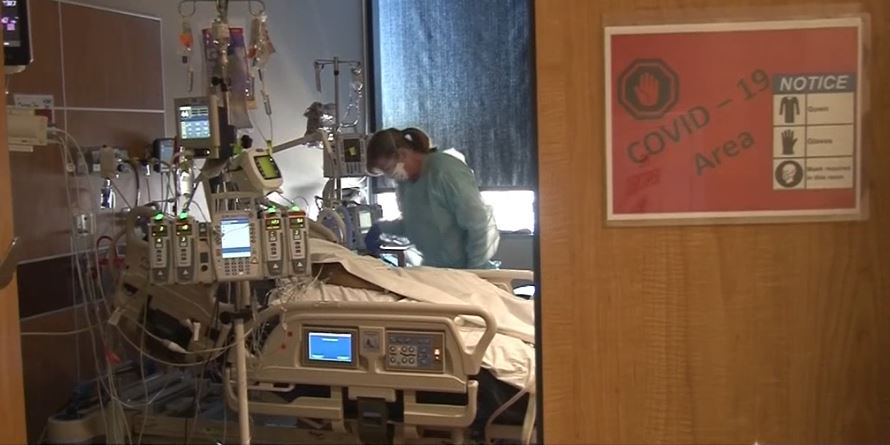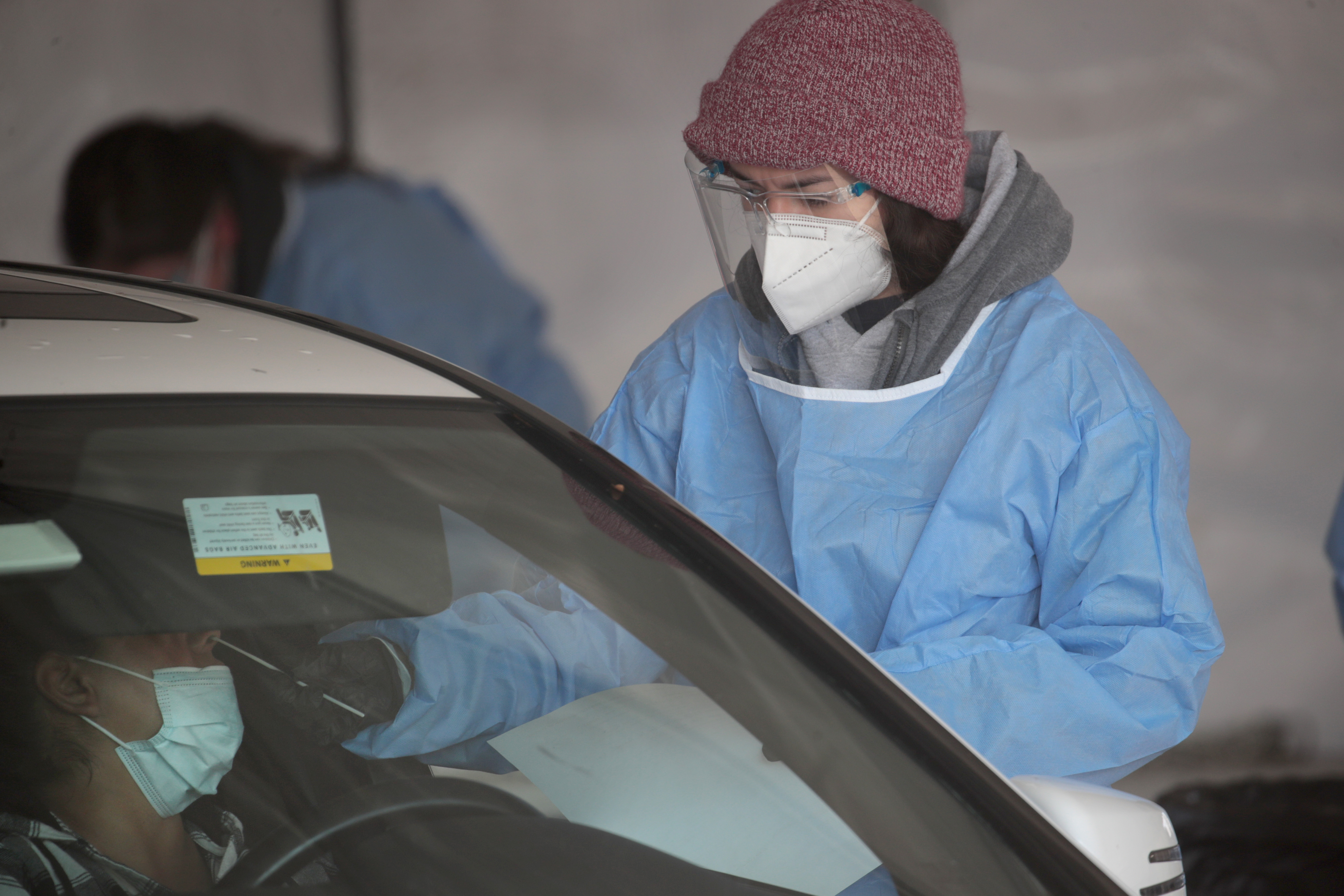If you test positive for COVID, how long could that last?
According to the Centers for Disease Control and Prevention, some people who contract COVID-19 can have detectable virus for up to three months, but that doesn't mean they are contagious.
When it comes to testing, however, the PCR tests are more likely to continue picking up the virus following infection.
"PCR test can stay positive for a long time," Chicago Department of Public Health Commissioner Dr. Allison Arwady said in March.
Feeling out of the loop? We'll catch you up on the Chicago news you need to know. Sign up for the weekly Chicago Catch-Up newsletter here.
"Those PCR tests are very sensitive," she added. "They keep picking up dead virus in your nose for sometimes for weeks, but you can't grow that virus in the lab. You can't spread it but it can be positive."
The CDC notes that tests "are best used early in the course of illness to diagnose COVID-19 and are not authorized by the U.S. Food and Drug Administration to evaluate duration of infectiousness."
For those isolating due to a COVID infection, there is no testing requirement to end isolation, however, the CDC recommends using a rapid antigen test for those who choose to take one.
Arwady said that guidance is likely related to determining whether or not someone has an "active" virus.
"If you did want to get a test on please don't get a PCR. Use a rapid antigen test," she said. "Why? Because the rapid antigen test is the one that will look to see...do you have a high enough COVID level that you are potentially infectious? Now, a PCR test, remember, can pick up up sort of traces of the virus for a long time, even if that virus is bad and even if it's not potentially transmitting."
So what else do you need to know about testing for COVID?
How long after COVID exposure could you test positive?
According to the CDC, the incubation period for COVID is between two and 14 days, though the newest guidance from the agency suggests a quarantine of five days for those who are not boosted, but eligible or unvaccinated. Those looking to get tested after exposure should do so five days after the exposure or if they begin experiencing symptoms, the CDC recommends.
Those who are boosted and vaccinated, or those who are fully vaccinated and not yet eligible for a booster shot, do not need to quarantine, but should wear masks for 10 days and also get tested five days after the exposure, unless they are experiencing symptoms.
Still, for those who are vaccinated and boosted but are still looking to be cautious, Arwady said an additional test at seven days could help.
"If you're taking multiple at home tests, you know, the recommendation is five days later take a test. But if you have taken one at five and it's negative and you're feeling good, chances are very good that you're not going to have any more issues there," she said. "I think if you're being extra careful there, if you wanted to test again, you know, at seven even, sometimes people look at three to get an earlier sense of things. But if you're gonna do it once do it in five and I feel good about that."
Arwady said testing is likely not necessary after seven days following exposure for those who are vaccinated and boosted.
"If you had an exposure, you're vaccinated and boosted, I don't think that there is any need to be testing, frankly, past about seven days," she said. "If you want to be extra careful, you can do it at 10, but just with what we're seeing, I would consider you really in the clear. If you're not vaccinated or boosted, I certainly have a much higher concern that you could get infected. Definitely, ideally, you'd be seeking out that test at five and I would do it again, you know, at the seven, potentially at that 10."
When is the best time to get tested after exposure?
The CDC states that anyone who may have been exposed to someone with COVID should test five days after their exposure, or as soon as symptoms occur.
"If symptoms occur, individuals should immediately quarantine until a negative test confirms symptoms are not attributable to COVID-19," the guidance states.
Illinois Department of Public Health Director Dr. Ngozi Ezike said that incubation times could be changing, but those who test early should continue testing even if they get negative results.
"We might be learning that the time of incubation might be a little shorter. So maybe you'd be testing at two days," Ezike said. "Obviously if you're symptomatic, you test right away. But you know, if you want to test at two days, but that negative test... the two days should not make you think, 'Oh good, I'm clear,' you know? You might want to test again and of course symptoms you cannot ignore - scratchy throat, headaches, all kinds of symptoms - anything new can be a symptom of this new illness."
How soon might COVID symptoms appear?
According to earlier CDC guidance, COVID symptoms can appear anywhere from two to 14 days after someone is exposed to the virus.
Anyone exhibiting symptoms should get tested for COVID-19.
Some people may never experience symptoms, though they can still spread the virus.
A person is also considered contagious before symptoms appear.
When are people with COVID most contagious?
The CDC says that its guidelines were updated to reflect growing evidence that suggests transmission of COVID-19 often occurs one to two days before the onset of symptoms and during the two to three days afterward.
"This has to do with data from the CDC that really showed after seven days there's virtually no risk of transmission at this point," Arwady said. "And in that five-to-seven-day window, you know, there's some depending on whether people have been vaccinated, underlying conditions, etc., but the risk drops a lot and the feeling is that in the general population, combined with masking, etc. the risk really is very low."
For those without symptoms, CDC guidance states they are considered contagious at least two days before their positive test.
How long should you quarantine or isolate?
First things first, those who believe they have been in contact with someone who has COVID and are unvaccinated should quarantine. Those who test positive, regardless of vaccination status, must isolate, according to the Centers for Disease Control and Prevention.
Here's the difference between the two:
Quarantine
Those who have been within six feet of someone with COVID for a cumulative total of at least 15 minutes over a 24-hour period should quarantine for five days if unvaccinated, or if they are more than six months out from their second vaccine dose, according to updated CDC guidance issued Monday.
Once that period ends, they should partake in strict mask use for an additional five days.
Previously, the CDC said people who were not fully vaccinated and who came in close contact with an infected person should stay home for at least 10 days.
Prior to Monday, people who were fully vaccinated — which the CDC has defined as having two doses of the Pfizer or Moderna vaccines, or one dose of the Johnson & Johnson vaccine — could be exempt from quarantine.
Those who are both fully vaccinated and boosted do not need to quarantine if they are a close contact of someone with COVID, but should wear a mask for at least 10 days after exposure. The same goes for those who are fully vaccinated and not yet eligible for their booster shot.
Local health authorities can also make the final determination about how long a quarantine should last, however, and testing can play a role.
Illinois' health department said it will adopt the CDC revised guidelines on isolation and quarantine for COVID.
In Chicago, those who travel to or from certain parts of the country and are unvaccinated must quarantine upon arrival to the city, but the length of time they should do so for depends on whether they get tested for COVID.
The city has not yet said if the new CDC guidance will change its travel advisory guidelines.
As of Tuesday, the city's travel advisory recommends those who travel from designated warning states should:
- Get tested with a viral test 3-5 days after travel AND stay home and self-quarantine for a full 7 days.
- Even if you test negative, stay home and self-quarantine for the full 7 days.
- If your test is positive, isolate yourself to protect others from getting infected.
- If you don’t get tested, stay home and self-quarantine for 10 days after travel.
Isolation
People who are positive for COVID should stay home for five days, the CDC said Monday, changing guidance from the previously recommended 10 days.
At the end of the period, if you have no symptoms, you can return to normal activities but must wear a mask everywhere — even at home around others — for at least five more days.
If you still have symptoms after isolating for five days, stay home until you feel better and then start your five days of wearing a mask at all times.
So how do you calculate your isolation period?
According to the CDC, "day 0 is your first day of symptoms." That means that Day 1 is the first full day after your symptoms developed.
For those who test positive for COVID but have no symptoms, day 0 is the day of the positive test. Those who develop symptoms after testing positive must start their calculations over, however, with day 0 then becoming the first day of symptoms.
When should you call a doctor?
The CDC urges those who have or may have COVID-19 to watch for emergency warning signs and seek medical care immediately if they experience symptoms including:
- Trouble breathing
- Persistent pain or pressure in the chest
- New confusion
- Inability to wake or stay awake
- Pale, gray, or blue-colored skin, lips, or nail beds, depending on skin tone
"This list is not all possible symptoms," the CDC states. "Please call your medical provider for any other symptoms that are severe or concerning to you."
You can also notify the operator that you believe you or someone you are caring for has COVID.
Top COVID Stories - NBC 5
What if you test positive using an at-home test?
Those who test positive using an at-home test are asked to follow the latest CDC guidelines and communicate the results to their healthcare provider, who is responsible for reporting test results to the state health department.
According to Chicago-area health departments, people should assume the test results are accurate and should isolate from others to reduce the risk of spreading the virus.
"If you test positive for COVID-19, you must isolate," Arwady said. "There is no need to repeat a positive at-home test in a medical setting. We don't want people going into the emergency department just to get a tested. Treat a positive as a positive, stay home and isolate for five days."
When can you be around other people after having COVID?
If you had symptoms, the CDC says you can be around others after you isolate five days and stop exhibiting symptoms. However, you should continue to wear masks for the five days following the end of symptoms to minimize the risk to others.



